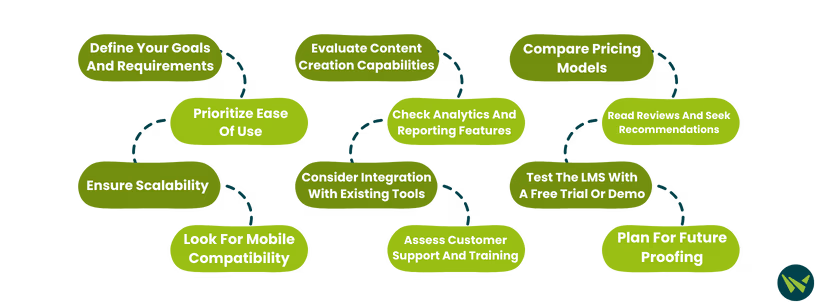
The modern, competitive business environment presents many unique challenges for startups to thrive. They must innovate quickly, scale efficiently, and build a strong organizational culture while operating with limited resources.
Implementing a learning management system (LMS) is an effective way for startups to overcome these challenges. It offers a structured way to onboard employees, train teams, and facilitate continuous learning. Simply put, there are many benefits of an LMS. However, to get them, selecting the right platform for your business is important.
Learn more about how to choose the best LMS for startups in this comprehensive guide.

Before diving into the sea of LMS options, it is important to identify your specific goals and requirements. Ask yourself:
Having a clear understanding of your needs will help you narrow down your options and avoid paying for unnecessary features.
A complicated system can lead to frustration, low adoption rates, and wasted time. Since startups often operate with small teams and limited resources, using such a system may divert attention from core business activities and slow down productivity.
This can ultimately hinder growth, as employees struggle to navigate an inefficient platform rather than focusing on the tasks that drive the company's success. Therefore, it is crucial to choose an LMS that offers an intuitive dashboard. Look for an LMS with the following:
Many LMS providers offer free trials or demos, so take advantage of these to test the platform’s usability.
Your startup won't remain a startup forever. You'd want it to grow and turn into a successful business. Therefore, choose an LMS that grows with you. It should be able to scale seamlessly as your team expands. So, consider the following factors when selecting the right platform:
Remember, a scalable LMS ensures you won’t outgrow the system and need to migrate to a new platform later.
With more companies opting for remote and hybrid work environments, it's important to ensure the selected LMS has mobile compatibility.
Look for an LMS that offers:
This ensures employees can access training materials anytime, anywhere, from any device.
One of the main purposes of LMS platforms is course creation. The ability to design and deliver tailored courses allows startups to ensure that their employees are equipped with the right skills, knowledge, and competencies. This is why it is important to select an LMS that supports:
Additionally, if your startup lacks in-house content creation expertise, consider an LMS that offers pre-built courses or templates.
6. Check Analytics And Reporting Features
Data-driven decision-making is essential for startups. It helps businesses make informed choices based on real-time insights rather than relying on intuition or assumptions. An LMS with strong reporting and analytics tools can help you track:
These insights can help refine your training programs and measure their impact on business outcomes.
Startups often rely on a variety of tools for communication, project management, and human resources (HR). However, switching between these tools can be a hassle, prolonging the process. Therefore, it is recommended to choose an LMS that integrates seamlessly with your existing tech stack.
This reduces friction and ensures a smooth workflow for both administrators and learners.
Even the most user-friendly LMS may require some support, especially during the initial setup phase. Good customer support can save you time and frustration, ensuring your LMS implementation is successful. Therefore, you must take custom support into account when selecting the LMS.
Budget is a critical factor for startups, so it’s important to understand the pricing models of different LMS platforms.
Be sure to consider both the upfront costs and long-term value when evaluating pricing options. That said, your decision shouldn't solely depend on pricing. Consider the required features, reviews, and other factors to make an informed decision.
Before making a final decision, research what other startups and businesses have to say about the LMS. This will help you understand the strengths and weaknesses of each platform. For this, look for:
Most LMS providers offer free trials or demos, which allow you to test the platform before committing. Use this opportunity to:
A hands-on experience will help you determine if the LMS is the right fit for your startup.
Technology evolves rapidly, and your LMS should be able to adapt to future trends. This will ensure your investment remains relevant in the long term. To find a platform that can support your startup for a long time, consider:
Besides that, it's important that you keep up with emerging trends in the learning and development industry.
Here are a few popular LMS platforms that are well-suited for startups:

Overall, there's no one-size-fits-all formula for selecting the best LMS. Since the requirements vary from company to company, thoroughly assessing your startup's specific needs, goals, and resources is the right approach. This will help you choose an LMS that supports your team's development and drives long-term success.
